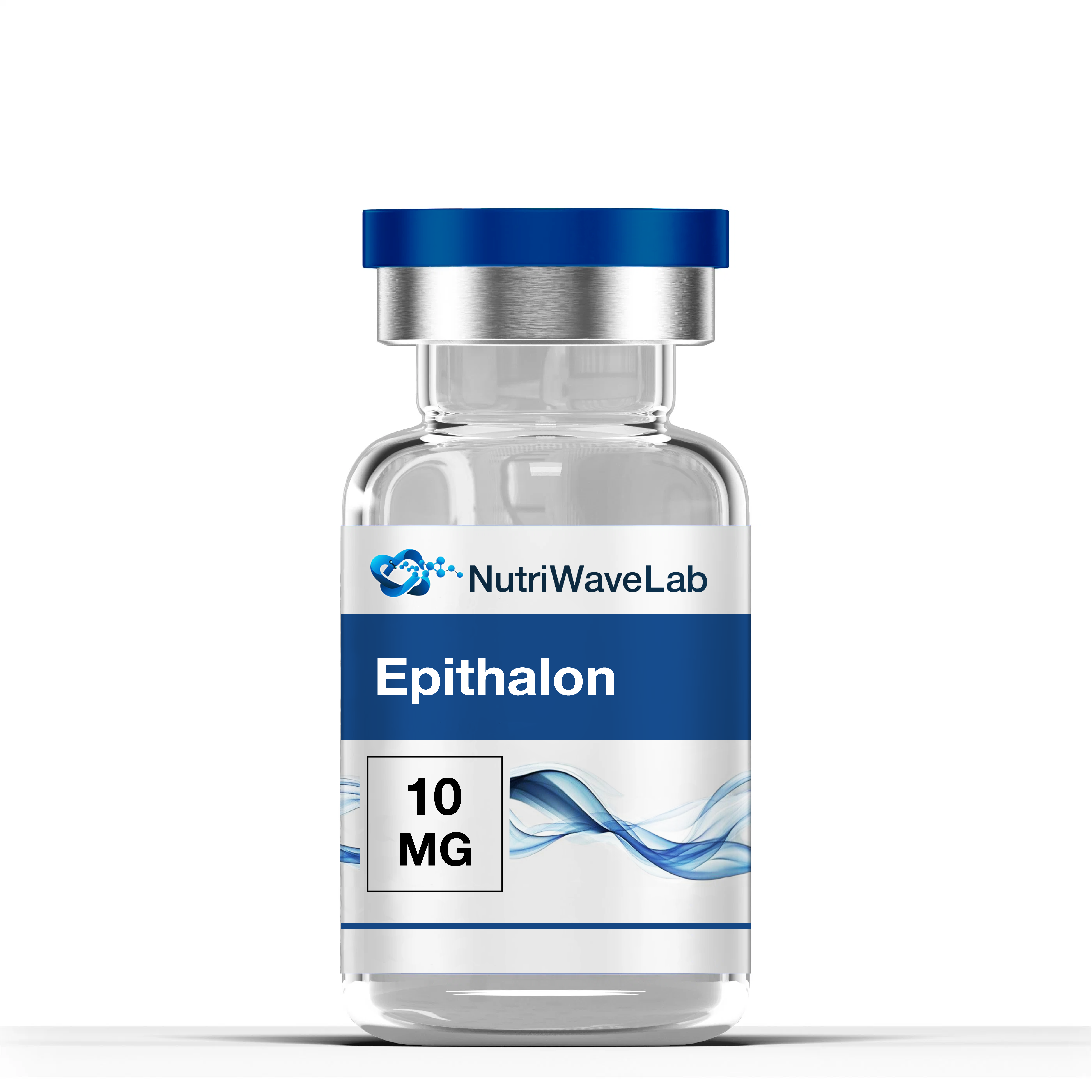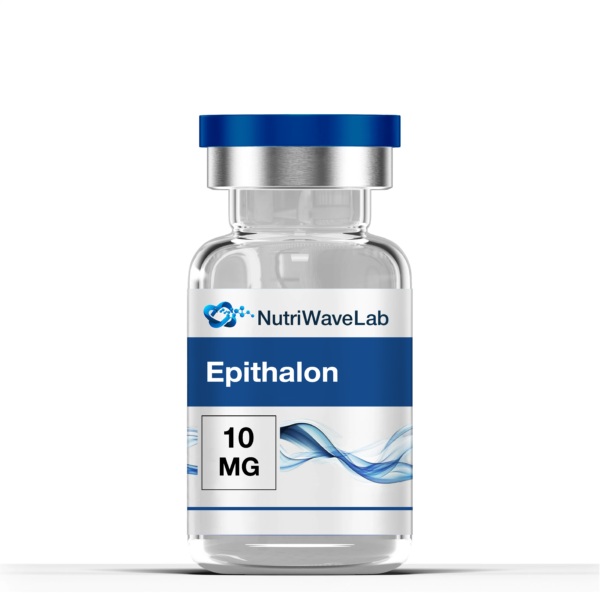Epithalon (Epitalon) 10mg
$0.00
- when buying 5 units of goods 5% discount
- when buying 10 units of goods 8% discount
6 in stock
Epitalon (Epihtalon)— The Peptide of Longevity
What Is Epitalon
Epitalon (also known as Epithalamin, AGAG, or AEDG) is a short synthetic peptide developed in Russia in the 1980s by Professor Vladimir Khavinson.
It gained attention for its ability to activate the enzyme telomerase and stimulate melatonin production, both of which play a crucial role in cellular regeneration and longevity.
In laboratory studies, Epitalon demonstrated the ability to slow down age-related changes, improve immune and reproductive function, and reduce oxidative stress in various animal models.
Chemical Structure
-
Amino Acid Sequence: Ala-Glu-Asp-Gly
-
Molecular Formula: C₁₄H₂₂N₄O₉
-
Molecular Weight: 390.34 g/mol
-
CAS Number: 307297-39-8
Telomerase Activation and Longevity
One of the most studied mechanisms of Epitalon is its ability to activate telomerase, an enzyme that helps maintain telomere length — the protective ends of chromosomes that shorten with each cell division.
Research suggests that longer telomeres may contribute to extended cellular lifespan and better genomic stability.
Epitalon also exhibits antioxidant properties, reducing the damage caused by free radicals and helping protect DNA from age-related degradation.
Gene Expression and DNA Regulation
Beyond its antioxidant and telomerase activity, Epitalon appears to influence the expression of multiple genes involved in immune balance and cellular repair.
It has been shown to interact with promoter regions of genes such as:
-
CD5 – supports immune cell differentiation
-
IL-2 – stimulates T-cell production and immune signaling
-
MMP2 – regulates skin and connective tissue integrity
-
Tram1 – enhances protein synthesis
-
AANAT & pCREB – influence melatonin synthesis and circadian rhythm regulation
These findings suggest that Epitalon may help maintain cellular homeostasis by restoring normal gene function and supporting internal biological rhythms disrupted by aging.
Epitalon and Skin Health
Studies on aged animals have shown that Epitalon promotes fibroblast activity — the cells responsible for producing collagen, elastin, and other structural proteins.
By stimulating fibroblast regeneration, Epitalon may help restore skin elasticity and improve tissue repair capacity.
Additionally, the peptide has been observed to reduce caspase-3 activity, a key enzyme in programmed cell death (apoptosis), thus extending cell viability in connective tissues.
Antitumor Research
In several animal studies, Epitalon has been shown to slow tumor progression and reduce metastasis.
It has been investigated in the context of HER-2/neu-positive breast cancers, leukemia, and testicular tumors.
Researchers have also found that Epitalon may restore the expression of the PER1 gene, which is involved in circadian rhythm control and tumor suppression.
Maintaining healthy PER1 activity could enhance the body’s ability to regulate abnormal cell growth and improve sensitivity to radiation therapy.
Melatonin Regulation
Melatonin, a hormone secreted by the pineal gland, plays an essential role in sleep and aging processes.
Studies on elderly primates and human subjects demonstrated that Epitalon restores the natural nocturnal rhythm of melatonin secretion, helping to rebalance circadian cycles and support immune resilience.
Ocular Research
In animal models of retinitis pigmentosa, Epitalon improved retinal structure and bioelectrical responsiveness.
Approximately 90% of subjects in these experiments showed measurable improvements in visual function following peptide administration.
Safety and Research Use
Epitalon has demonstrated low toxicity, good tolerance, and high subcutaneous bioavailability in laboratory studies.
It is supplied strictly for research and educational purposes only.
This compound is not approved for human or veterinary use, not a dietary supplement, and not intended for medical treatment or diagnostic purposes.
Potential Areas of Ongoing Research
-
Telomerase activation and DNA protection
-
Reduction of oxidative stress
-
Circadian rhythm normalization
-
Melatonin synthesis and pineal gland function
-
Immune modulation and inflammation control
-
Tissue regeneration and skin repair
-
Tumor growth inhibition mechanisms
References (Research Sources)
-
Anisimov V.N., Mylnikov S.V., Khavinson V.K. Pineal peptide preparation epithalamin increases the lifespan of fruit flies, mice and rats. Mech Ageing Dev. 1998;103(2):123–132. [PubMed]
-
Khavinson V.K., Bondarev I.E., Butyugov A.A. Epithalon peptide induces telomerase activity and telomere elongation in human somatic cells. Bull Exp Biol Med. 2003;135(6):590–592. [PubMed]
-
Dzhokhadze T.A., et al. Functional regulation of genome with peptide bioregulators by hypertrophic cardiomyopathy. Georgian Med News. 2013;(225):94–97. [PubMed]
-
Anisimov V.N. et al. Effect of Epitalon on biomarkers of aging, life span and spontaneous tumor incidence in mice. Biogerontology. 2003;4(4):193–202. [PubMed]
-
Khavinson V.K., Tarnovskaya S.I., Linkova N.S., et al. Short cell-penetrating peptides: a model of interactions with gene promoter sites. Bull Exp Biol Med. 2013;154(3):403–410. [PubMed]
-
Linkova N.S., Kuznik B.I., Khavinson V.K. Peptide Ala-Glu-Asp-Gly and interferon gamma: their role in immune response during aging. Adv Gerontol. 2012;25(3):478–482. [PubMed]
-
Chalisova N.I. et al. Short peptides stimulate skin cell regeneration during ageing. Adv Gerontol. 2014;27(4):699–703. [PubMed]
-
Linkova N.S. et al. Peptide Regulation of Skin Fibroblast Functions during Their Aging In Vitro. Bull Exp Biol Med. 2016;161(1):175–178. [PubMed]
-
Vinogradova I.A. et al. Effect of Ala-Glu-Asp-Gly peptide on lifespan and spontaneous tumors in rats. Bull Exp Biol Med. 2007;144(6):825–830. [PubMed]
-
Kossoy G. et al. Effect of the synthetic pineal peptide Epitalon on spontaneous carcinogenesis in mice. In Vivo. 2006;20(2):253–257. [PubMed]
-
Anisimov V.N. et al. Inhibitory effect of Epitalon on spontaneous mammary tumors in HER-2/neu transgenic mice. Int J Cancer. 2002;101(1):7–10. [PubMed]
-
Vinogradova I.A. et al. Geroprotective effect of Ala-Glu-Asp-Gly peptide in rats exposed to different illumination regimens. Bull Exp Biol Med. 2008;145(4):472–477. [PubMed]
-
Gery S., Komatsu N., Baldjyan L. et al. The circadian gene PER1 and DNA damage control in cancer cells. Mol Cell. 2006;22(3):375–382. [PubMed]
-
Korkushko O.V. et al. Normalizing effect of pineal gland peptides on melatonin rhythm in old monkeys and elderly humans. Adv Gerontol. 2007;20(1):74–85. [PubMed]
-
Khavinson V., Razumovsky M., Trofimova S., Grigorian R. Epitalon improves retinal function in retinitis pigmentosa. Neuro Endocrinol Lett. 2002;23(4):365–368. [PubMed]
Product Use: THIS PRODUCT IS STRICTLY FOR SCIENTIFIC RESEARCH PURPOSES ONLY. It should only be used in laboratory settings. All product information on this website is provided solely for educational purposes. The law strictly prohibits introducing this product into the body of humans or animals. Only licensed professionals should handle this product. This product is not a drug, food, or cosmetic and should not be improperly classified or used as such.



Reviews
Clear filtersThere are no reviews yet.